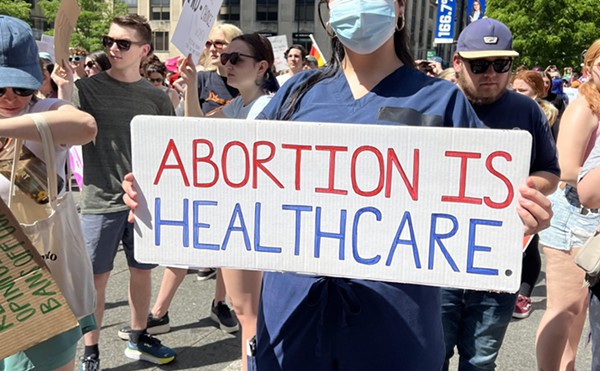|
Cities across the country could lose their public-access television stations overnight under a set of bills being considered by Congress.
The four related bills slash almost all the funding for community television and strip municipalities of their right to regulate local cable franchises, according to Anthony Riddle, executive director of the Alliance for Community Media (ACM). Riddle and ACM represent more than 1,000 community television centers across the United States, including Media Bridges in Cincinnati.
The bills would help telephone companies get into the cable television business at the expense of local control over cable TV, Riddle says.
"The argument that the telephone companies make is that they want to come in and compete with cable providers but they don't want to spend the time and energy to negotiate with local communities," he says.
'We don't want to pay'
At issue is whether cable providers will have to pay franchise fees to the communities they serve. Current law says that anyone who wants to be in the cable television business — which until recently has been only one or two companies in a given region — must pay these fees. The franchise fees are a form of rent for the public right-of-way the cable TV companies use — telephone poles and underground access to homes.
Cable companies have to negotiate with each local municipality to agree upon a fee. Time Warner Cable pays the city of Cincinnati about $3.2 million a year.
Of that amount, $2.5 million goes into Cincinnati's general fund and about $750,000 goes to pay for community television. The franchise fee provides about 90 percent of Media Bridges' total budget.
The collection of bills in Congress is destined to become a new Telecommunications Act, according to Tom Bishop, executive director of Media Bridges. This would overhaul the Telecommunications Act of 1996, which de-regulated the industry by eliminating caps on how many radio stations could be owned by any one company. One effect of the 1996 legislation was transforming Clear Channel from a company that owned less than 100 stations into the media behemoth it is today, operating almost 1,200 stations nationally.
These bills, supported by telephone service providers Verizon and SBC, include:
· Senate Bill 1504, the Broadband Investment and Consumer Choice Act, sponsored by Republican senators John Ensign of Nevada and John McCain of Arizona. The bill would create a federal standard franchise fee for all telecom companies wherever they operate, eliminating local oversight and cutting local funding to a pittance, Riddle says.
· House Resolution 3146 and its companion bill, Senate Bill 1349, the Video Choice Act of 2005. These are written so that, if a telephone company is paying one franchise fee to run Internet and phone lines, it doesn't have to pay another to run television across those same lines.
"We already pay a franchise," says Brian Blevins, spokesman for Verizon. "We don't want to pay for a second franchise."
Blevins insists that worries among community television stations are unfounded. He says Verizon is committed to seeing public access survive and to paying a fair price to use public space.
He says Verizon supports de-regulation because it makes it possible for telephone companies to enter the TV market quickly, without having to negotiate with thousands of local communities. This benefits subscribers across the country by making the market competitive more quickly and lowering prices, he says.
Populist broadcasters
But Bishop says Verizon is talking out of both sides of its mouth. Despite the company's claims, the bills would eliminate Community Line Service Fees — the $750,000 paid to Cincinnati's Media Bridges — which represent the lion's share of funds paid to communities all over the country, Bishop says.
"There is no such thing as 'de-regulation,' " Riddle says. It's just different regulation, favoring the economic interests of big business and short-changing the public, he says.
Media Bridges trains hundreds of people a year. Anyone can take classes in basic computer skills, Web site design and gain broadcast experience. The services are free of charge, and public access TV airs the broadcast productions.
Bishop says many people go to Media Bridges to learn professional skills (see "Bridge to the Community." issue of June 1-7).
"We have a gentleman that now works for us part-time who was homeless," he says. "He started hanging around at Media Bridges, getting his life together, assisting people with shows and just a few months ago we hired him."
Local non-profits also depend on Media Bridges' free services. Christian Appleby, Media Bridges' coordinator of nonprofit services, says he serves more than 120 local organizations a year, making films that help promote their work and train their staff.
Stephanie Graves, executive director of the Literacy Network of Greater Cincinnati, says her agency couldn't afford to create videos otherwise. The Literacy Network, which serves more than 600 children with reading disabilities every year, recently worked with Appleby to craft a film for 7- to 9-year-olds who have severe reading problems.
"I cant even put a dollar sign on it," Graves says. "We couldn't do it without them."
Hoxworth Blood Center is another user of Media Bridges services, utilizing film production work that could cost up to $15,000 annually if it were commercially provided, according to Michael Anderson, Hoxworth spokesman.
More than public access TV is at risk, Riddle says.
"It's not a television program," he says. "It's really a process of self-definition for people and communities ... being able to process our lives."
If the bills pass, financial interests are going to have cultural and political control of society, he says.
"You have to decide now: Are your children going to be free or are they going to have every piece of information that they get controlled by people that want to exploit them?" Riddle says. "And once this is in place, you will never get it undone because you can't get it undone without a dialogue, and the only place to have a dialogue will be on those two wires controlled by those two companies." ©





